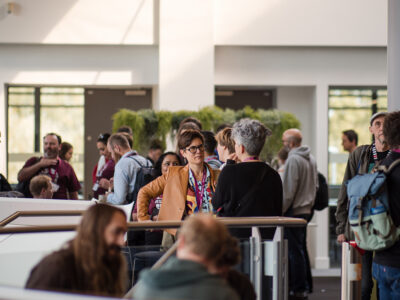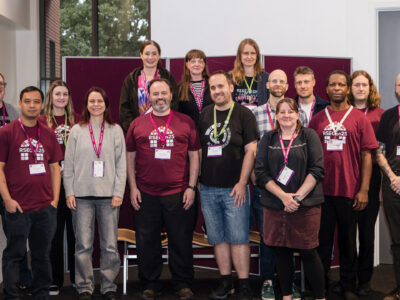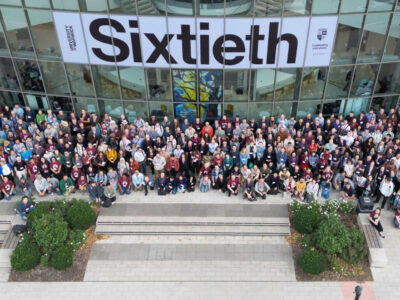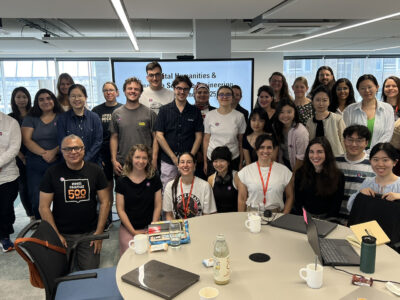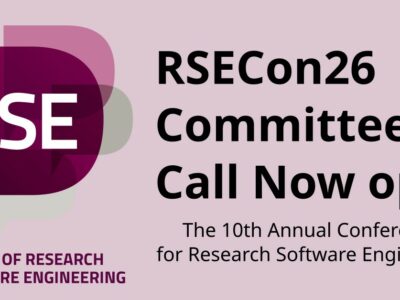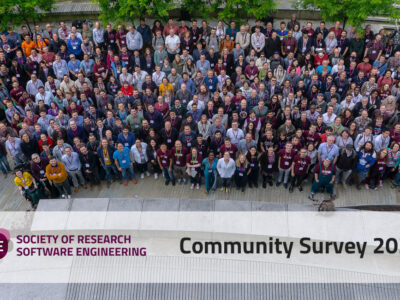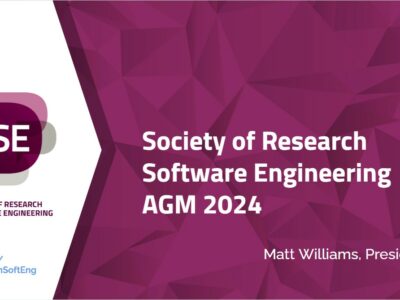2025 Trustee Elections and Candidate Statements
The Society of Research Software Engineering is holding its annual Trustee elections for 2025. In this blog post, we will outline the process and introduce you to the candidates.
- Voting will open on Monday 28th July 2025.
- Voting will close at 23:59 BST on Friday 22nd August 2025.
All valid members at the moment of polling will be emailed instructions to vote, including their personal voting token. Please follow the link in the email to access the voting form.
The Election
We have 8 trustees standing down at the AGM this year. We received 10 applications for the 8 available slots, so we are holding a competitive election. Voting will be conducted online, the votes will be counted and verified by our scrutineers (Simon Hettrick and Jonathan Cooper), and results will be announced at the AGM.
Update: an additional trustee has had to stand down, so there are now 9 vacancies.
- The AGM will take place during RSECon25 at 5 pm on Wednesday 10th September.
Candidate Statements
The following candidates have nominated themselves. Please read the candidate statements carefully before casting your vote.
Their status as Society members and their eligibility to stand have been verified, and their nominations have been seconded by other Society members.
Thank you to every candidate for nominating themselves and for their dedication to the research software community. Thanks also to the people who seconded these nominations and to our scrutineers for their assistance in the election process.
The candidates standing for election are (in random order):
- Iain Barrass
- William Haese-Hill
- Elena Breitmoser
- James Tyrrell
- Martin O’Reilly
- Ryan Field
- Gillian Sinclair
- Mark Basham
- Adrian Mircea Nenu
- David Beavan
Iain Barrass
University of Glasgow
1) Why do you want to be a trustee of the Society?
I have been in RSE roles for a number of years in government and academic institutions. Throughout my career I have seen the value of professional communities which nurture and support individuals in this path. I have personally benefited significantly from events like the Aspiring Leaders workshop and the RSE Leaders network.
I have previously participated in the Society’s conference organization and in the mentoring scheme and appreciate what these offer to RSEs in their development. More widely, the Society can continue to strengthen an environment in which individual RSEs and RSE groups can grow and thrive. As a trustee, I would like to contribute to the sustainability of this environment.
2) Which of the current activities that the Society engages in are you best suited to help with?
Beyond being a Trustee, I am most suited to the Secretary role.
3) What can you bring to the role of trustee that would be useful in running the Society?
I sat on the conference programme committee in 2024 and 2025, in the Talks team (member, 2024; chair, 2025). In these roles, I contributed to the overall vision of the conferences as well as providing specific input to the conferences’ content. I helped develop guidance for submissions and reviews and supported the fair evaluation of contributors’ work. I was part of the visible presence of the 2024 conference team, supporting the day-to-day running of the conference sessions.
My role as head of research software engineering in a large college requires strong advocacy skills to build support of RSE functions in the eyes of senior management and research colleagues. It requires an ability to understand the needs of individuals and institutional units of wide-ranging sizes and to ensure that service offerings remain fit for purpose.
4) What do you hope to get out of being a trustee for the Society?
I would find it rewarding to contribute to the Society and the RSE community in a way I haven’t previously and to be able to continue the opportunities from which I have benefited.
I would also like to meet a much broader subset of the RSE community and to develop my interpersonal and organizational skills within a markedly different structure from those previously experience.
William Haese-Hill
University of Glasgow
1) Why do you want to be a trustee of the Society?
I have been a member of several committees/groups during my current role at the University of Glasgow, covering an array of RSE and RSE-adjacent domains: computational biology, HPC infrastructure, etc. I feel that the roles and responsibilities of the trustee align closely with my own experiences with these various groups, placing me in a strong position to offer meaningful value. As SocRSE is the leading organisation supporting RSEs in the UK, it would be a great privilege to play a pivotal role in shaping its future.
2) Which of the current activities that the Society engages in are you best suited to help with?
I believe I could cover many of the responsibilities listed above across various roles, based on a great deal of experience doing the same for similar groups. To name a few particular areas of interest:
- Manage website infrastructure and content
- Communications planning, organising social media, blog posting, etc.
- Conference planning
- Monthly meeting scheduling
3) What can you bring to the role of trustee that would be useful in running the Society?
I have been a committee member of the Glasgow Computational Biology Community for the last year or so. During this time, I have been an active part of planning meetings for the upcoming annual conference (that we’re hosting in September), as well as the recent annual “Hackathon” event. For both of these events, I will be/have been acting as a key facilitator on the day, ensuring their smooth running. In addition, I successfully managed to apply for funding to host and facilitate our inaugural annual “writing retreat” in May (https://glasgow-compbio.github.io/events/202505_WoS/), which garnered glowing feedback from the attendees. Other responsibilities include managing the Twitter, BlueSky and LinkedIn social media accounts for the Community, posting regular updates about upcoming monthly events, etc. I also keep the website updated (developed using R/Quarto).
Another group that I have been a member of the past year or so is the MARS Governance Group within the University of Glasgow. This acts as a steering group (of sorts) for our college HPC system (“MARS”). I am personally responsible for minuting and scheduling our bimonthly meetings, and am an active contributor to discussions.
Otherwise, I’d hope that my experiences working as a software engineer in both academia and industry for a number of years will have some value in shaping direction.
4) What do you hope to get out of being a trustee for the Society?
I would hope to continue to build on the skills and experiences I have developed so far for the benefit of my career and personal growth. As someone who has only been a member of SocRSE for the last year, I will value the opportunity to get to know some of the more established members of the community and to learn from them. I’d also relish the opportunity to take on some roles and responsibilities that are outside my comfort zone.
Elena Breitmoser
EPCC/University of Edinburgh
1) Why do you want to be a trustee of the Society?
I have been working as a RSE since my MSc/PhD in Theoretical Physics, then specialising in it through my work as Applications Consultant at EPCC for many years. I have seen the increasing awareness of the RSE role in the community and its growing acknowledgement as a crucial and unique position, which is
unfortunately often still not supported with appropriate career paths compared to other, more established research career paths in academia, despite its indispensible role for the development of
Research Software. Being a project manager on a recent Software Sustainability Institute (SSI) project about Research Software allowed me to gain deeper insights into the RSE landscape, e.g. by participating in interviews with a variety of stakeholders (https://zenodo.org/records/10473186), which confirmed this
on-going need for support. I hope being a trustee for the RSE would give me the opportunity to advocate for establishing this role further. In addition, this project also showed the need to make the RSE role accessible to a broader demographic, a goal I am also enthusiastic about promoting and researching further.
I have seen the society grow over the last years and benefitted from their events by attending e.g. RSE conferences (also the German deRSE). Being a trustee would allow me to take part in shaping the direction of the society and set priorities for the interests of RSEs.
I am curious to learn new things and skills building on my past experience by being a trustee, benefitting from provided training and by gaining hands-on experience.
2) Which of the current activities that the Society engages in are you best suited to help with?
For all of my work good communication skills are indispensable. I have experience as both a Project Manager (PM) & a RSE.
- In charge of project budgets, working closely with our financial officer.
- Dealt with legal documents (e.g. DPIAs, Data Sharing Agreements, Ethical approvals).
- Regularly chairing meetings across institutions, circulating agendas in advance & tracking discussion/actions via minutes, wiki or git repos & issue boards.
- Organise workshops.
- Work with Linux-VMs, service/operations management both as RSE & PM.
- Provide technical user support via our helpdesks.
- Set-up & use mailing lists.
- Set up & maintain both a static website & a shiny server for external customers.
- Enthusiastic about the promotion of EDIA, WHPC started at EPCC.
- Involved in an SSI-lead project, which included a survey, focus groups and stakeholder interviews, that also investigated EDIA.
- Lead the writing of reports/deliverables & the publication on social media.
3) What can you bring to the role of trustee that would be useful in running the Society?
I have been working at EPCC (UoE) as a project manager for several years as well as a RSE for over two decades since my PhD in theoretical Astrophysics. I have worked with numerical simulations and parallel computing on many HPC-projects on tier1 HPC services in collaboration with UK- and EU-partners from academia.
I have been providing technical user support via multiple service desks for national HPC services, as well as helping to establish a service desk for our work with the Scottish Government.
My knowledge in data science includes the development and online teaching of courses in ML and DL and involvement in a variety of technical work on the EIDF (Edinburgh International Data Facility) since 2018.
I was a course organiser for the Dissertation course of EPCC’s MSc dissertation programme for several years, representing the course at the Board of Examiners. The MSc programme had between 25 to 70
students every year at the time, and there can be up to 30 member of EPCC staff involved as project supervisors and keeping a good work relationship with them was key.
I have been project managing a variety of projects with UK- and EU-partners from academia and the public sector, including work with Safe Havens. Many of these projects run for several years, include
leading teams of various sizes and and across institutions as well as the responsibility for a budget of several hundred thousand pounds.
I participated in the ‘AURORA Advance HE’s leadership development initiative for women in 2020/21’ to deepen my knowledge as a project manager.
I have been leading and supervising teams in my role as a project manager and individuals in my roles as line manager and MSc supervisor for MSc students in HPC and Data Science for many years.
I have been representing EPCC to external academic or industrial clients, and at national and international conferences.
4) What do you hope to get out of being a trustee for the Society?
I am passionate about helping younger colleagues from diverse backgrounds to find their way into becoming and staying RSEs and being able to find long-term career options in a field that will be welcoming to all who are keen on working in Research Software development. I would be able to and interested in contributing to any of the trustee roles, though, and they all offer interesting challenges that will benefit the RSE community.
Becoming a trustee is a great opportunity to get an even better understanding of RSEs’ needs and challenges across a broader spectrum than just from within EPCC. The work would feed back into
my work related to SSI/EVERSE/FAIR projects I have been involved in, with supporting students, and working with RSEs as a project or line manager.
The role would allow me to participate in interesting work, discussions and collaborations with other trustees across institutions with common goals and to take over leadership roles in a broader setting.
I hope to gain a better understanding of how societies work and are run, and how I can shape and influence direction.
Being a trustee could show me if this is something I might like to do more of in similar roles in the future to support the community as well as how to do it effectively for the benefit of its members.
James Tyrrell
University of Birmingham
1) Why do you want to be a trustee of the Society?
I would like to be a trustee to be able to give back to the community and help advocate for the importance of Research Software Engineering as a profession. I found RSE after several years of being unsure where my career was headed – a PhD, a brief stint as a Research Fellow, several years as a Software Engineer in industry – and knew quickly that this was what I wanted to be doing. I am passionate about extending the same opportunity to others.
My role in the University of Birmingham’s Research Software Group is that of a Senior Research Software Engineering Manager and, although it’s a cliché, no two days are the same! My focus is on the delivery of the RSE Service, which includes the technical delivery of research software, line- and project- management, and establishing new collaborations with researchers across the University. My hope is that my ability to work on a variety of tasks and willingness to give anything a go would serve me well as a trustee of the Society.
I am already involved in several initiatives on behalf of the Society. I am part of the steering committee for two Special Interest Groups: Green RSE and Regional RSE Groups. I have reviewed submissions for RSECon25 and arranged our group’s attendance at the conference for the last two years running.
My main ambition here is to be able to support the long-term goals of the society in whatever way I can. I have significant experience of working in teams large and small, and a proactive attitude to getting things done. I feel fortunate to have found a career that I care deeply about and want to be able to help ensure that research software engineering is underpinned by a healthy Society that continues to cater to a broad demographic.
2) Which of the current activities that the Society engages in are you best suited to help with?
I am confident in my ability to deliver on the general responsibilities of Trustees, such as those concerning governance and operational activities. I carry similar responsibilities in my capacity as a manager and have exposure to some of the Society’s ways of working through my involvement in SIGs.
I am capable at handling tasks concerning organisation and logistics and would be comfortable taking on Secretary- or Conference-related roles. I regularly use GitHub/GitLab to manage projects and initiatives.
I am enthusiastic (but a touch inexperienced) about web development and website infrastructure. I have been involved in work to ensure that the websites hosted by our team meet accessibility standards and have developed new features for existing websites.
I would love to be able to contribute to the Society’s work on EDIA. I am aware that I am privileged to have been able to find this career and that there is a lot more work to be done to improve access to RSE.
3) What can you bring to the role of trustee that would be useful in running the Society?
I have extensive experience of managing projects and operational activities through my day-to-day work running the RSE Service at the University of Birmingham. This includes establishing new collaborative projects, requirements gathering, budget handling, and project planning within the team to determine priority tasks on a week-by-week basis.
I organised and chaired RSE Midlands 2025 earlier this year with the help of my excellent organising committee. This was a successful event that attracted external sponsorship and was attended by RSEs (and those in adjacent roles) from across the Midlands. I was particularly pleased with the SSI Fellows session in the afternoon, which included an introduction to the SSI Fellowship Programme and talks from local SSI Fellows. The experience has prepared me for organising further conferences in the future (something I would like to continue to be involved in).
Between my work in industry and as an RSE I have worked effectively in teams of various sizes – from 2 people to 50+. I strive to be an active and helpful team member, identifying opportunities to assist my colleagues if needed. I am also transparent about my own work and progress, highlighting early if I need help or am unlikely to complete a task by a given deadline.
In my role on the steering committee of the Green RSE SIG, I am taking a lead on exploring the responsibility of individuals and institutions regarding the environmental impacts of research. This is nascent work and something I plan on devoting more time to in the coming months. Matters of governance and responsibility are something I pay careful attention to, and I would be keen to ensure any work I undertook as a Trustee was in alignment with the Society’s charitable aims.
The most important thing I can offer is a genuine enthusiasm for RSE as a profession and a desire to get stuck into the work that needs doing, whatever it might involve.
4) What do you hope to get out of being a trustee for the Society?
I want to meet wider sections of the community and build a better understanding of what RSE looks like in practice at different institutions and in different contexts. I want to hear success stories, e.g., in championing EDIA and Green initiatives, and learn about how I could be a better proponent for these things I care about. I would like to gain more experience in how to grow a community, so that I can feed this back into ongoing work with RSE Midlands and Green RSE. I want the opportunity to learn from experienced colleagues who have demonstrated confident leadership of SocRSE over many years. I feel well-placed to contribute to work that the Society is doing on topics like RSE recognition and wellbeing that will bolster the whole community. One of the things I like most about my role as an RSE is that it is fundamentally a supportive role; I enjoy acting in this capacity and hope to be able to also support the work of the Society as a 2025 Trustee.
Martin O’Reilly
The Alan Turing Institute
1) Why do you want to be a trustee of the Society?
I’ve been a trustee of the Society for the past 3 years. I originally put myself forward because I have felt really welcomed and supported by the RSE community and I think that the Society plays a big part in supporting and enabling the community. I really felt I had “found my people” when I went to my first RSE conference, and I want to continue to support the community as a Society trustee so that others can have that same experience. One of the things I’ve been keen to support in my time as trustee has been to expand the Society’s support for community-organised activity through regional and special interest groups. I’ve been very supportive of the expansion of these groups over the past few years and, as part of the Society finance team, I’ve helped the Society take a multi-year view in its financial planning, allowing it to expand the financial support available to this community-organised activity.
2) Which of the current activities that the Society engages in are you best suited to help with?
I think I am best suited to continue helping the Society as part of the finance team. I was vice-treasurer last year and have been treasurer this year. I have had previous experience with budgeting and financial reporting for the engineering teams I’ve led at The Alan Turing Institute and outside of academia and, over the past two years I’ve expanded on this to gain a solid experience of budgeting and reporting for the Society, including the statutory reporting requirements we are subject to as a charity. I’d be happy to continue in the treasurer role this year, but I would be equally happy for another trustee to step into that role and to take on a more supporting role in the finance team or anywhere else I can best support the Society.
3) What can you bring to the role of trustee that would be useful in running the Society?
I’ve been a trustee of the Society for the past 3 years and have built up a reasonably broad experience of the trustee role. I’ve taken on the roles of vice treasurer last year and treasurer this year, and I’ve also been part of the organising committee for the 2023, 2024 and 2025 annual RSE conferences. In that time, I’ve led work to improve the Society’s financial reporting and budgeting. I think this has helped the Society in being able to take a multi-year view in its financial planning, helping it be confident in expanding the financial support it provides the community and helping the wider conference organising committee to more confidently plan the conference each year.
Outside of my trustee role, I’ve been a member of the research engineering group at The Alan Turing Institute since its founding in 2016 and have led the group since 2019 as Director of Research Engineering. The group has grown from 4 to 40 in that time and has gone through several iterations of its operating model, roles and processes as the Institute has transitioned from a start-up to an established research organisation and had iterated on its research strategy. Throughout that time I’ve been heavily involved in shaping not just the evolution of the team and its practices, but also the way we do that evolution – through open, collaborative consultation across the whole team. Many of the practices that were first established in the research engineering group have since been adopted across the wider Turing, and I’m keen to help raise the bar in how RSEs are supported by their organisations across the RSE profession.
4) What do you hope to get out of being a trustee for the Society?
I have really enjoyed my last 3 years as a Society trustee. It’s been really fulfilling to help support such a unique and supportive professional community and to work with such friendly and committed colleagues both in my fellow trustees and in the wider community of volunteers that support the society through helping organise the conference and joining the Society’s various working groups. I’d find it very rewarding to continue to do my bit as part of this group as a Society trustee.
Ryan Field
University of Glasgow
1) Why do you want to be a trustee of the Society?
I was inspired to become a trustee as I believe in the RSE Community and the Society and would like to contribute to ensure the Society of Research Software Engineering is the best it can possibly be, with members in mind. I would like to give back to the community that hosted the first conference I presented at, which also enables the RSE community to network and come together. I have a lot of skills which I can bring to the Society and can give back to the community which helped shape my career. I would like to help ensure the society is welcoming and inclusive to the RSE community and beyond, giving members a safe place to network, be involved and help them as they progress across all stages of careers.
2) Which of the current activities that the Society engages in are you best suited to help with?
While I have a well-rounded skill set, I would be best suited to help with EDIA activities as I am very well versed in EDIA policy, procedure, additionally being the UCU Glasgow Equalities officer. However, I possess many skills that cross many of the current activities the society is engaged in for example. I possess excellent time management, and planning skills; I can do both full stack development and have knowledge of Web and IT infrastructure, including virtual machines, Google Workspace etc. As well as being an organised person with excellent communication and diplomacy skills. Finally, as someone who has only recently had the opportunity of gaining the job title of research software engineer, despite doing the work of one, I can feed into the career development activities as well as providing insight into the recognition of RSEs.
3) What can you bring to the role of trustee that would be useful in running the Society?
I am currently the workshops chair for this year’s RSE Con, being an active member of the conference committee, feeding into the programme, workflows and processes, as well as ensuring the workshops team works effectively and work well with each other. Additionally, I am currently the UCU Glasgow Equalities officer, giving me experience with EDIA matters and policy, negotiation, understanding of contract, policy and employment law surrounding a multitude of subject and issues. Within UCU Glasgow, I run the equalities subcommittee, and have helped pass several motions surrounding EDIA. Additionally, supporting members directly where necessary. I have formerly been a disability champion of an Athena Swan Self-Assessment Team (SAT) for a gold award organisation, helping to ensure equality and diversity within the organisation, feeding ideas into the SAT and helping implement these ideas. As well as being on the RSECon committee this year, I have also been on the Evidence Synthesis and Meta-analysis Conference in R (ESMARConf) organising committee, helping to deliver an online conference, contributing to planning, scheduling, logistics as well as chairing sessions such as the panel discussion on AI in systematic reviews.
4) What do you hope to get out of being a trustee for the Society?
From being a trustee, I hope to gain further experience in governance, as well as helping shape and move the society forward positively. I look forward to expanding my knowledge of how running a charitable society works, as well as being an active part of shaping the Society. I hope to be able to provide insight into career development and recognition, whilst also learning from others. Additionally, I look forward to the new opportunities being a trustee can provide, as well as meeting new people, and raising my profile within the community. It would be a great opportunity to meet like-minded people and give back to a community who has supported me in my journey to becoming a Research Software Engineer.
Gillian Sinclair
University of Manchester
1) Why do you want to be a trustee of the Society?
The last 3 years of being a trustee have been really enjoyable but it has opened my eyes to how much more the Society could be doing for its members and the RSE community. There are so many great ideas for taking the Society forward and we can only achieve this by having a full complement of trustees. I’m keen for my experience of the last 3 years to not to go to waste and to use that to continue to improve the Society for its members.
I have recently become the Network Manager for DisCouRSE (https://discourse-network.github.io/), a UKRI-funded Network+ project that will encourage and support the development of leaders across all digital Research Technical Professional (dRTP) roles including RSEs. This fits perfectly with my current trustee role and will ensure that the Society is involved in funding calls and firmly embedded in the project deliverables.
As well as my new role, I continue as Research IT Relationship Manager at the University of Manchester (UoM), home to one of the largest groups of RSEs in the country. Over the last 18 months my UoM role has become more focused on strategy formation and implementation. I think these skills would be invaluable in helping the Society to put in place a strategy to develop and grow to the benefit of the members.
My time committed to the Society would be split across both my roles and I have the full backing of my line manager, Robert Haines (Director, Research IT, University of Manchester) and Jonathan Cooper (DisCouRSE Lead, Director of Collaborations, ARC, UCL).
2) Which of the current activities that the Society engages in are you best suited to help with?
Over the last 3 years I have held a variety of positions in the Society including being a member of the Governance group in my role as Event lead, Secretary and, most recently, Comms team member and Special Interest Group co-lead. I would be happy to continue in my current roles applying the knowledge I’ve gained over the last 3 years. However I am also interested in ensuring that we provide an exciting and enticing membership to our community and that we capitalise on our international standing.
3) What can you bring to the role of trustee that would be useful in running the Society?
I have held several roles in the Society over the past 3 years including Event lead, Secretary (current) and, most recently, Comms team member and Special Interest Group co-lead.
The Event lead was a new role created at my suggestion to separate it from the conference activity. Due to the large amount of work created by the conference, events were quite often overlooked and applications to the Events and Initiative funds could be missed by busy trustees. I put into place a system for managing E&I fund applications resulting in the allocation of all the funding for that year (and successive ones). I also put into place a reporting system where we captured metrics from the events allowing easy production of the events section for the annual report.
This year I took up the position of SIG co-lead which involves helping Society members to set up and run new SIGs for the RSE community. This involved another new process creation to ensure that the SIGs have everything they need in place to be launched to the RSE community. It’s been a busy time with many SIGs being proposed at RSECon24 and then launching over the first 6 months of the year! There are now 7 SIGs, many more than the Society has previously had and it’s been a pleasure to enable enthusiastic members to share their knowledge and passion with the wider community.
My role at Manchester has evolved from comms and community building to strategy formation and implementation. I hope that I can put these new skills to use in the Society. These skills would be advantageous in planning the future direction of the Society and helping us to achieve our goals including making the Society attractive to people at all stages of their career and providing tangible benefits for our members.
4) What do you hope to get out of being a trustee for the Society?
My various roles in the Society have all had their challenges but all have been informative and I have learnt a lot! I’d like to make the most of what I have learnt and for these experiences to continue to benefit the Society.
There are many experiences I have really enjoyed such as attending RSECons and seeing the range of expertise on display from across a wide and diverse community. I have also met and worked with many amazing people over the last 3 years that I would not have met any other way!
I’ve added to my skill set of working with a distributed set of people from diverse backgrounds who are all volunteers at the end of the day with a lot of other demands on their time. This can be challenging but brings its own rewards.
On a more selfish note, if I was re-elected, I would like to work with the Society to increase its visibility and membership at the University of Manchester. Our RSE team continues to grow and I would like to ensure that RSE is seen as a viable exciting career by our graduates. As SIG co-lead I have enabled several new groups over the last 10 months and I have done something similar at UoM enabling user groups in Python, R , C++ and more. I would like to connect these groups together as I believe there is a great deal of overlap and potential for knowledge sharing.
Mark Basham
Rosalind Franklin Institute
1) Why do you want to be a trustee of the Society?
I have been a member of the RSE community almost since its inception and remember talking about it with others when I first became an SSI fellow at the Collaborations workshop. I am incredibly enthusiastic about the movement, and as soon as I was able to, made sure that the group that I run makes use of the RSE titles. I was actually inspired to apply when preparing for a UKRI meeting to discuss their new data policy, and realised that the RSE Society was mentioned in the Open Data government policy as a stakeholder. I decided that maybe this would be a good time to get involved as data is one of my main passions in the field. In addition to this many of my team at the Franklin are involved in one way or another and I would like to support them if possible.
2) Which of the current activities that the Society engages in are you best suited to help with?
I am happy to help where is most needed, but would like to play a more secondary role initially, and potentially do something more advanced next round. I don’t think I am qualified to be the treasurer. As stated above though, data and open access are a key passion of mine, and I don’t know if there is a role explicitly looking at that, but it may be something of interest for the society in the future.
3) What can you bring to the role of trustee that would be useful in running the Society?
I have a reasonable amount of historical knowledge of the community, its roots and purposes, and know many of the past members. I am also a trustee of my local scout group, and so am aware of some of the processes and responsibilities of being a charity trustee (Here I manage the groups risk register primarily). Finally I am placed at a senior level in a new EPSRC research institute, and so am in a reasonably good position to advocate for the society.
4) What do you hope to get out of being a trustee for the Society?
I am at the stage of my career when being involved with things that are larger than the organisation I currently work in are very appealing to me, and this feels like an excellent opportunity.
Also it would be nice to be able to share some of my enthusiasm for the movement more widely.
Adrian Mircea Nenu
Google/The University of Manchester
1) Why do you want to be a trustee of the Society?
My goals in becoming a trustee for the Society of RSE are to:
- Support the software engineering and research community through direct involvement beyond by further enabling an organisation whose aim is to unite touch on both academia and industry, theory and application, which is a life-long pursuit I have been often struggling with personally in my career, where I have found myself jumping between the two, from doing a part-time masters to making the hard call to go from big-tech back into a full-time PhD programme.
- Build upon my managerial, administrative and organisational knowledge and expand it further with direct benefit to an organisation I believe in the mission of, bringing experience from having managed a team of software engineers, organised hackathons and summits, and involvement in IEEE as a volunteer.
- As someone who originally came from Romania to the UK to study and work, naturalised, left for the US to pursue career goals, and now decided to return to the UK to pursue a research degree, I find myself empathising with and excited to contribute to the society’s goals to be a home for international members without a homebase, for bridging academia and research, and its primary goal of supporting UK based research engineers.
2) Which of the current activities that the Society engages in are you best suited to help with?
I offer flexibility to adapt to evolving trustee needs. I am prepared to immediately contribute to the Web & Infrastructure, Conference, and Membership committees, bringing energy and passion to maximise platform utility and member benefits. I am confident in my ability to make meaningful contributions in decision-making, project management, and requirements gathering. I am eager to drive initiatives connecting with IEEE and explore opportunities for RSE members to obtain certificates of involvement and engage in volunteering. My aim is to foster a cohesive ecosystem that promotes the society’s growth through an expanded web platform and volunteering opportunities, diversifies member benefits, and expands its reach within academia and industry, leveraging my network and experience across multinational corporations and academic institutions.
3) What can you bring to the role of trustee that would be useful in running the Society?
I have been a software engineer at Google for the last 3 years, previously at Morgan Stanley for 5 years, with a BSc in CS, MSc in Business Analytics, and elevated senior membership and volunteering experience at IEEE. I will begin a PhD in CS at the end of the year in the UK at the University of Manchester to deep-dive into AI research leveraging my software engineering background, pursuing to increase my chances to make an impact in the future.
At Morgan Stanley, I managed a team of software engineers and lead projects end to end from requirement gathering to production release and stakeholder management.
At Google, I executed on roles that (1) required interaction with external companies to Google and understanding their own processes and support them in onboarding on Google product; (2) publicly facing web platforms that communicate how Google products can support end to end processes and evaluation frameworks for assessing the maturity of companies wanting to interact with Google; (3) developed software deployed at planet scale putting research into practice.
During my Masters in Business Analytics, I have explored project management and data analysis geared towards organisation management and machine learning.
In my pursuits for further education I have taken extensive steps to expose myself to other view points and leaders in multiple sectors, such as through the University of Oxford’s Artificial Intelligence Programme where collaboration in diverse groups of leaders in the industry was enforced. On the other hand, I continuously deep-dive into the underlying concepts and algorithms, for example through my pursuit of a Micromasters in Statistics from MIT.
I have not been a trustee previously, but I am involved with IEEE as a volunteer, senior member and lead, and would be excited to contribute to the committees and working groups from a trustee capacity with RSE.
4) What do you hope to get out of being a trustee for the Society?
Through being a Society of RSE trustee I am looking to:
- Leverage my experience developing software to contribute to a platform that benefits others directly, in this case the members of the society, as I thrive on being able to create software that makes people’s lives better and in this case might benefit people’s careers directly.
- Contribute to a community I connect with deeply given my backgrounds and direction for the future.
- Experience collective decision making and the challenges that come with that, to be exposed to multiple opinions and work on balancing interests of different groups to achieve overall a benefit for all parties that need to be considered.
- Learn through the mentorship of previously seasoned trustees to grow as a communicator and leader, and benefit over the long term from the insight and knowledge brought by the opportunity to be part of a collective looking to grow not only themselves but the organisation for the benefit of all its members.
- Make use of and enhance my communication skills, both written and verbal, by putting them to good use addressing the needs and expectations of different stakeholders in the society.
David Beavan
The Alan Turing Institute
1) Why do you want to be a trustee of the Society?
After serving as a trustee for a term of three years, and most recently as President for one year, I’m more convinced than ever of the value and potential of the Society. I’ve seen first-hand how it can support, connect and elevate the Research Software Engineering (RSE) community, and I want to continue playing an active role in that work.
The Society has become a professional home for me. It’s where I’ve found like-minded people, shared challenges, and built lasting collaborations. Giving back to that community feels natural and necessary especially now, as the profession continues to grow in both scale and importance.
If re-elected, I’d like to help drive that growth by focusing on expanding the reach of the community, opening up more opportunities for our members to shape and contribute to activities, and helping to further establish RSE as a recognised and respected profession in its own right. I see the Society as a catalyst, amplifying the work and voices of its members, and I want to help it do that even more effectively.
2) Which of the current activities that the Society engages in are you best suited to help with?
I’d be happy to continue serving as President if that’s where I can be of most benefit. I bring relevant experience not just from the past year in that role, but also from earlier trustee responsibilities across governance, membership, and elections. Over that time. I’ve built strong relationships across the RSE community and with external stakeholders, which will continue to benefit the Society.
I’m comfortable with the day-to-day tasks that keep the organisation running, whether that’s reviewing policies, supporting working groups, or contributing to strategic planning. I enjoy working as part of a collaborative team (and make no mistake, it’s the team of trustees, volunteers and the membership that makes Society) that adapts to challenges, shares responsibilities, and supports each other. I’m always ready to chip in where needed, whether it’s steering long-term direction or making sure people feel welcome and listened to.
3) What can you bring to the role of trustee that would be useful in running the Society?
As a SocRSE trustee for three years, one area I initially focused on was the elections process, which I helped to reshape in 2023. That year we saw our first competitive election in some years, resulting in a full complement of trustees, something we’ve now managed two years in a row (and hopefully again this year). That has given the Society the diversity of thought, energy and ability to deliver for our members. Running that process required clarity in communications, a careful approach to governance, and the ability to encourage people to step forward and get involved.
As Vice-President, I learned a lot from my predecessor about the responsibilities and mechanics of running a charity. That foundation meant I was able to step into the President role with confidence and help keep things steady and transparent. In the last year, the Society has achieved much, for instance: supported a growing range of Special Interest Groups, funded multiple community-led initiatives, mentored a new cohort of RSEs and continued to deliver a strong and growing annual conference. None of those successes are mine alone, far from it, but I’ve worked to help shape and support the kind of organisation in which those efforts can thrive.
In my day job as a Principal Research Software Engineer, I lead a large and varied team, and bring experience of strategic planning, mentoring, stakeholder management and cross-organisational collaboration, skills that directly benefit being a Trustee. I’ve supported others through the Society’s mentoring scheme too.
4) What do you hope to get out of being a trustee for the Society?
Being a trustee has pushed me to grow as a leader, a planner, and someone responsible for steering a charitable organisation through both everyday decisions and longer term direction. I’ve become more confident navigating the legal and governance side of things, like working within Charity Commission guidelines, and balancing that with the practicalities of a volunteer-led organisation.
I’ve also learned a huge amount from working with such a thoughtful, skilled, and collaborative group of people. That experience has shaped how I listen, lead, and create space for others to contribute. If re-elected, I want to keep building on those experiences, to become a more capable, confident leader and to support others doing the same, and making plans to enable them to take over the reins.
Thank you for reading
Thank you again to all of the nominees for putting their names forward to support the Society.
Instructions will be sent via email to everyone who is a Society member on Monday 28th July, when the voting instructions will be sent out. This email will include a link to the form and a voting token, which must be submitted on the form when you vote.
The Elections working group for 2025 is: Abie Alexander-Ikwue (chair), Mike Simpson and Kirsty Pringle.


